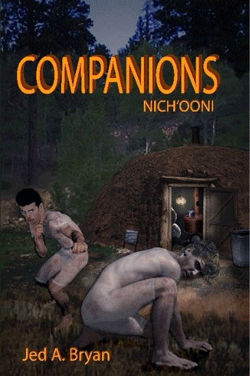Companions: Nich’ooni

Title: Companions: Nich’ooni Available: Amazon.com. Also available on Lulu and other places where e-books are sold |
A Novel by Jed A. Bryan
Reviewed by Karin Hendricks
June 2013
I recently had the pleasure of reading Jed A. Bryan’s novel Companions: Nich’ooni. It arrived in the mail and I literally could not put it down until I had finished it. I found it to be a captivating read, and one to which I could relate in a variety of ways as a gay Mormon who had tried so hard to “do what is right.”
This story of two gay missionaries on a Navajo reservation in Arizona is mixed with adventure, raw truth, and irresistible love. Based in part from Jed’s own missionary story, the characters reflect a sense of veracity yet eccentricity that made me shake my head in disbelief from time to time – until I remembered how very possible these stories of forbidden love, adventure, betrayal, and devotion really are.
The book is therapeutic to those of us who are still coming to know our true selves in light of the hurtful messages we received because of our sexuality. These companions’ journey to know themselves is wonderfully familiar, and yet the Navajo setting makes the story oh-so-new. I found it simultaneously comforting and thrilling to witness the evolution of the boys’ romantic relationship, knowing that every step they took closer to one another also reflected a step closer to personal self-awareness.
At the same time, their interactions and development of genuine love for the Navajo people opened their eyes to a world much larger than they had previously imagined. “Think of it as a mutual exchange,” says our protagonist, as his companion suggests that he has gotten “to the point of not knowing who is converting whom.” Similarly, the stories in this book invite us to question our tightly-held worldviews in a wonderfully frightening and liberating way.
From the Publisher:
This is the story of two young men put together as companions by Mormon Church powers in an isolated and largely ignored corner of Arizona. Both, according to dogma, are dual beings, bringers of the holy Word to the Navajo people, and homosexuals, monsters in disguise, murderers of their own posterity. It is a tale of their fight for self-recognition and ultimately, self-determination in a society that either ignores their existence or vehemently wishes them dead. It is also a myriad of other fights, other disasters between people, organizations, traditions and nature itself, swirling around them in a macabre dance of destruction and death. The difference between these unknown people and events and the world at large is scale and the essential things individuals have in their favor against survival of the fittest attitudes and realities: the ability to think, to analyze, and to make choices for themselves.